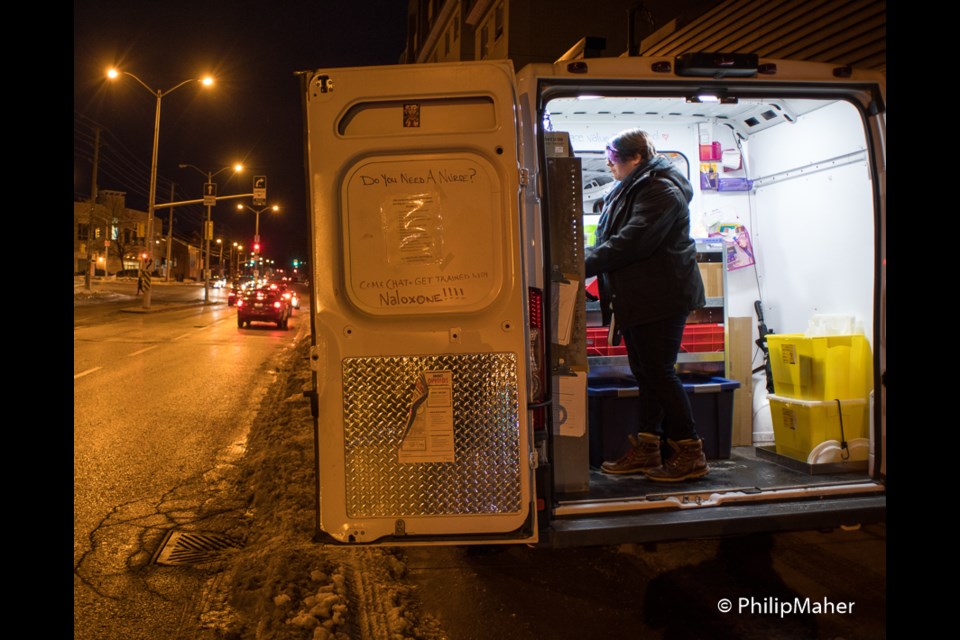When night falls, do you know what’s going on in downtown Guelph?
As we cocoon at home in Guelph, fending off the sub-zero February nights, a little-known squad invades the downtown core in search of contact.
The mobile team from the Guelph’s Sanguen Health Centre provides food, clothing, nursing support and needle exchanges to those living on the economical edge of our city.
The process of providing relief is no simple task. Sanguen Health collaborates the HIV/AIDS Resources and Community Health Centre (ARCH), Public Health and others. They combine their skills and provide support to people who are homeless and those affected by drugs. The community health workers help clients decrease harm to themselves and society by preventing hepatitis, HIV/AIDS and providing overall social assistance.
As night falls, the mobile team arrives at their second stop, Royal City Church located downtown. Their Life Centre offers free evening meals. As diners finish supper they call out, “The van has arrived.”
They head out from the warm church into the frigid winter air to form an orderly line. They’re handed food packs to take with them, and asked if they need warm clothing and a hot chocolate.
“These guys are great,” says a man, shivering in the cold, who identifies himself as Jake.
Others step into the relative privacy of the rear of the van, where they can receive blood tests for hepatitis and HIV. Nurses accept used needles and give clean ones. Medical problems are solved or referred to other community resources. In the past year, Sanguen Health has disposed of 10,537 needles. They have also given away 1,818 pairs of fresh socks, more than 1,000 pairs of gloves and other clothing and hygiene items.
“We are very concerned about what is happening as a result of fentanyl,” says Sanguen Health Centre program director, Colin McVicker. “Just two grains the size of salt can kill you. There has been a steady increase in overdoses and even deaths.”
Wellington-Dufferin-Guelph Public Health reports that opioid-related emergency department visits have significantly increased in Guelph. Between 2016 and 2017, the rate doubled to reach 74.6 per 100,000 residents in 2017. The city of Guelph is 37 per cent higher than the average for Ontario and 155 per cent higher than that of Wellington County in 2017. Some 4,000 people died across the country from overdoses that same year. Surprisingly, this is not just a young person’s problem. Those deaths where split relatively evenly from ages 20 to 60 years old.
Some Ontarians wonder about the value of needle exchange programs. Helping those living in poverty seems natural to many, but why help those affected by drugs?
But health providers and those working on the street enthusiastically support such efforts. Providing needles reduces the spread of disease. Interactions with van staff also provide the opportunity to interact with health providers. “It is a touchpoint to the health system where our clients can get access to counselling and other social supports,” says Shelly Howey, a nurse with the Wellington-Dufferin Guelph Public Health Unit.
Royal City pastor Kevin Coghill, shivering in the cold as he watches his diners line up at the van, agrees. “The van provides a positive community,” he says. “Our clients look forward to its arrival—it’s another way of building relationships.”
Sanguen Health distributed more than 500 Naloxone kits, in combination with training, last year. Some suggest that drug overdoses are a way of culling society. This unthinkable notion is based on a misguided oversimplification of an epidemic that reaches into all levels and ages of the Canadian social strata. Not only do these programs save lives, they save our taxes. For $175,000, this program is reducing very costly hospital visits and preventing the spread of debilitating and expensive illnesses like hepatitis or AIDS. That’s good value.
If the numbers do not convince you, then perhaps the more profound question is: What kind of society do we want to build? Are some in our society disposable? Tossing around statistics of those living on the margins does not give us a true sense of the suffering to daughters, sons, mothers, sisters and brothers who are our neighbours. Numbers can trivialize the emotional cost of suffering to those living on the margins of this great place called Canada.
Sanguen Health Centre’s “do no harm” approach is part of a global movement to meet people where they are, understand their issues and build bridges. Simply throwing people in jail, where drugs are already prevalent, or forcing them into drug programs has had marginal success.
In the words of Sanguen’s program director Colin McVicker, “Ultimately we want to help people get their lives together and get them off drugs, but that starts by building relationships and helping them gain stability.”
Sanguen Health Centre needs items for distribution to those in need—gently used or new socks, gloves, winter clothes, hygiene items, hats, knap Sacks and clothing of all kinds. For a complete list, or to drop off items you can contact them. Visit here for more information.
